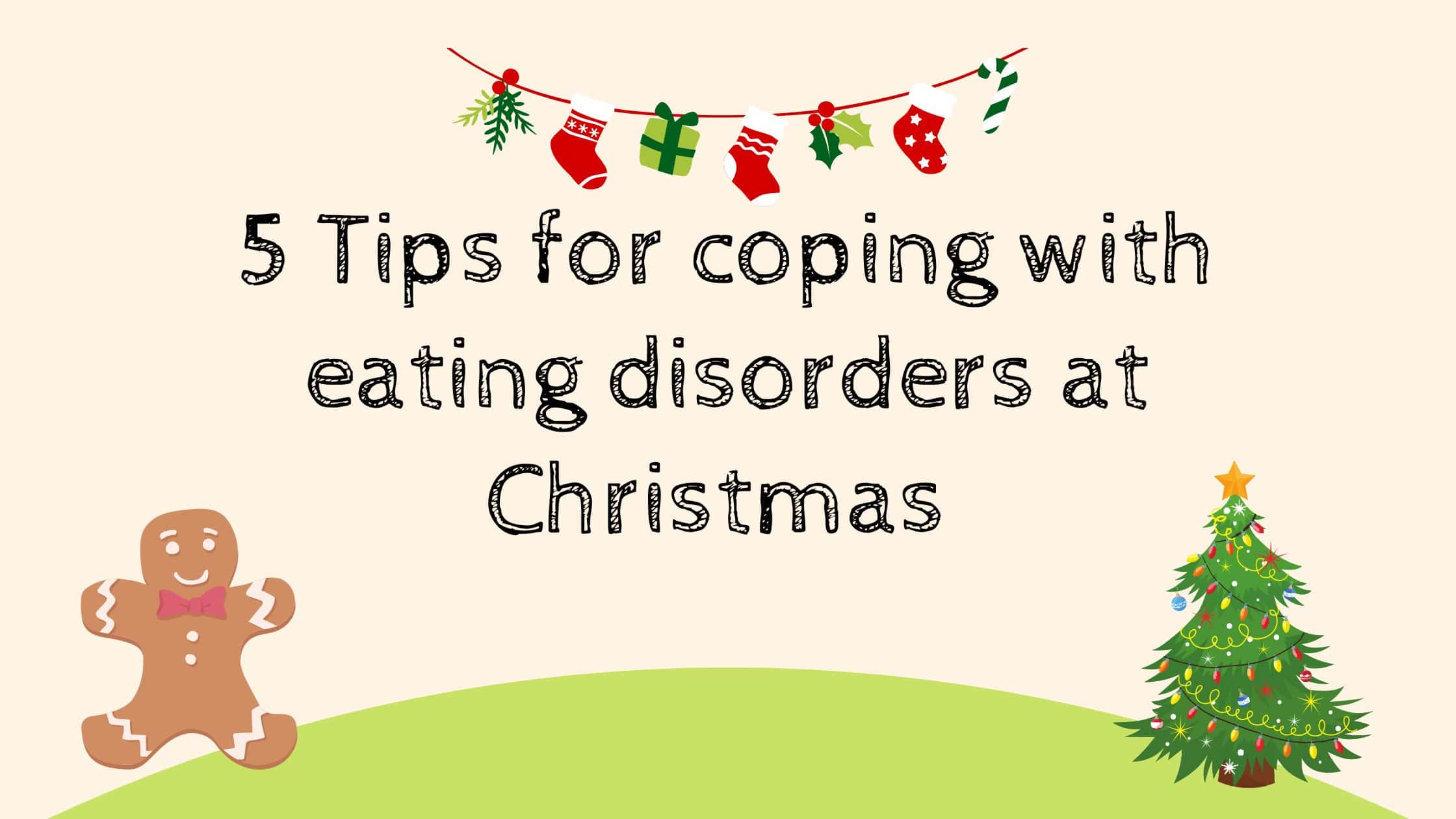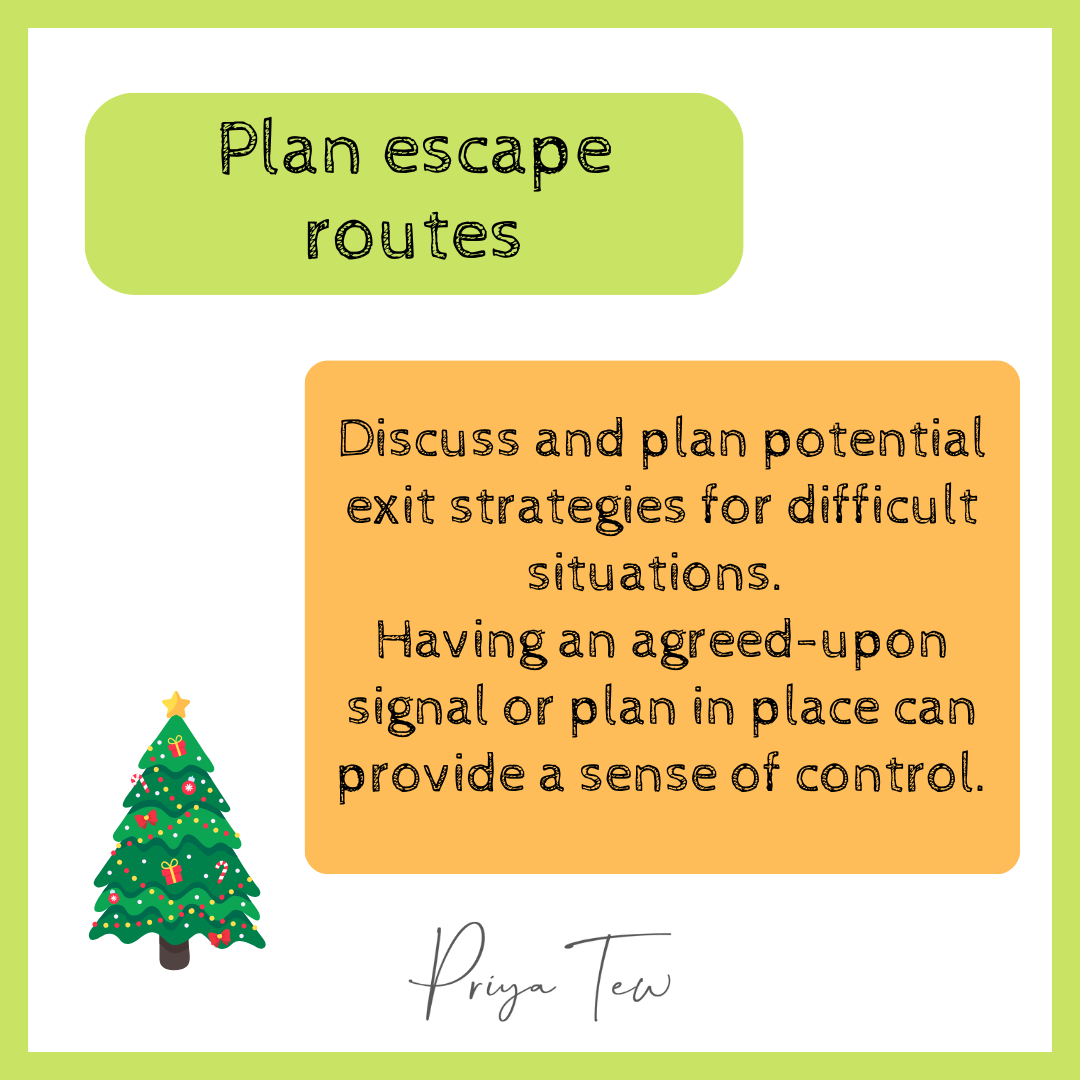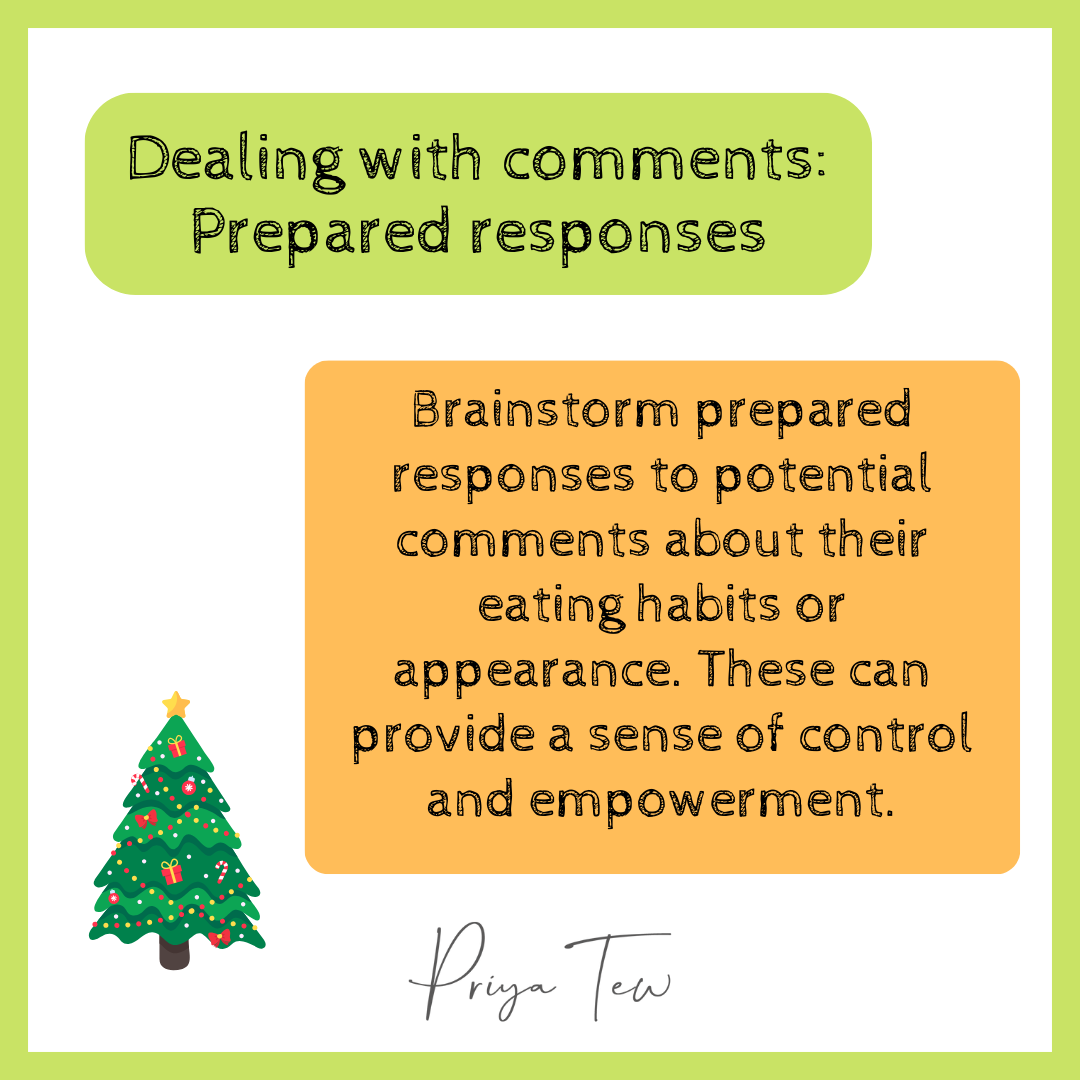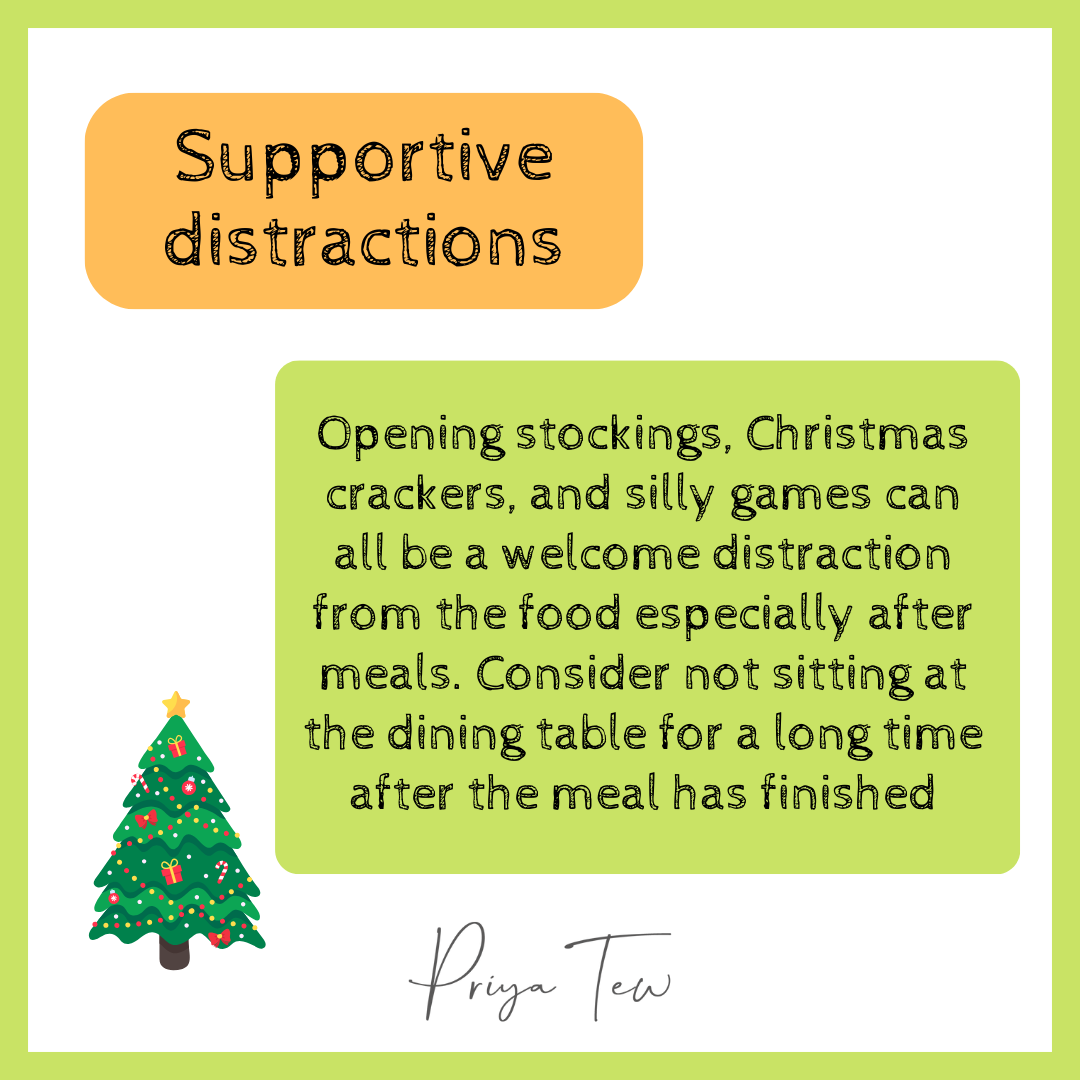
Tips for coping with eating disorders at Christmas
Having eating disorders at Christmas can be the toughest time of year! As the holiday season approaches, there is are so much excitement, hype and build up. Lots of people eagerly anticipate the joy of gatherings, feasts, and meals with loved ones. However, for those navigating the complexities of an eating disorder, this time can bring unique challenges. The constant social eating, festive treats and parties centered around food can increase feelings of guilt, shame, and anxiety.
As a health professional specializing in eating disorders, I understand the importance of a supportive environment during this time. In this extended blog post, we’ll delve deeper into five main areas with practical tips to help you navigate Christmas with an eating disorder. We’ll address common concerns such as family comments, maintaining healthy habits, challenging negative thoughts and beliefs, self-care strategies, and building a supportive environment. By implementing these strategies, individuals can navigate through the festivities with greater ease while prioritizing their mental and physical well-being.
1. Navigating eating disorder triggers: Dealing with comments from family and setting boundaries.
Family gatherings, while filled with love and joy, can also be accompanied by well-intentioned yet potentially triggering comments. Hopefully some of the closest people in your life are aware of what would upset you, but Christmas can mean other family members are around, here are some quick things you can do to let them know whatever they’re doing isn’t helpful. If you find yourself anxious about these situations, consider the following strategies:
- Communication is Key: Openly communicate your needs with close family members. Let them know how their or other peoples comments may affect you and provide guidance on more supportive language. Talk about the food plans for the period and any changes you think you will need. Christmas is a time to be enjoyed so it is ok to make suggestions about ways things will be easier for you.
- Establish Boundaries: Set clear boundaries about discussing food, weight, or appearance. Politely but firmly redirect conversations toward more neutral topics to create a safer space for yourself. If any talk makes you feel uncomfortable or upset (such as diet talk, too much talk of food, or commenting on your body) you can try removing yourself from the conservation by leaving the room for a few minutes. Such as going to the bathroom and taking a few breaths there.
- Change the Topic: You could prepare some conversation topics so if any food talk comes up that makes you feel uncomfortable, you can have them ready to change the conversation. For example, if someone says “This food is naughty- but it’s cool because the diet starts in the New Year” you can try “Speaking of New Year, what is your schedule like in January; will you be busy at work?” You could also speak about current events, future family occasions, TV shows, or pets.
- Identify Supportive Allies: Share your concerns with a trusted family member who can help deflect inappropriate comments or provide support during challenging moments. Set a code word with people you’ll be spending time with; so that if any diet or food talk comes into conversations, you can say your “code word!” or even text them so they are aware you’re feeling uncomfortable and the conservation can move along.






2. Maintain normal habits: strategies for consistent eating routines at Christmas
The holiday season often disrupts routines, which can be particularly challenging for individuals with eating disorders at Christmas. How can you stick to your meal plan if meals are at different times? Should you skip a snack if lunch is bigger and there is pudding? What about that buffet? Here are tips to help maintain a sense of normalcy:
- Stick to Meal Patterns: Strive to maintain regular eating patterns as much as possible. Consistency in some of your meal times and types of meals can provide stability during the holiday chaos. It may be you can have a normal breakfast and morning snack but then you have a large lunch with dessert. Then have a snack meal for tea and your usual snack. That is pefectly ok. Listen to your body and your wise thoughts, try to rationalise things without tracking and counting up what you have eaten. Use your knowledge and common sense to decide what else you need to eat for the rest of the day.
- The 80/20 rule: This can help some people as a guide. The idea is you stick to your meal plan 80% of the time and you can come off your meal plan and relax more around food 20% of the time. It is a normal and healthful way of eating – for example think how people eat in a more structured way during the week but eat differently at weekends. Now think about this as being 80% of the year you follow your normal meal plan/way of eating and 20% of the time you relax your eating.
- Plan Ahead: Preparation is key. Try to get as much information about what is going to be happening in advance. If you take some of that element of surprise out of the equation you will reduce the anxiety somewhat. Plan out which days you will be eating differently over the festive time. What will that look like? It is a really good idea to take the more challenging meals and days to your dietitian session/therapy session and chat these through. Or you could do this with a close family member. Remember it is ok to plan, I’m cooking Christmas dinner and will be planning the food for the family for the holiday season – planning is normal.
- Make some swaps: Enjoying some festive foods may ve scary but it is also key to do. So plan out a list of festive or different foods you want to be able to eat. When are you going to do this? Can you swap a normal snack for a mince pie? One of my clients worked out a mini mince pie was not that different to her usual cereal bar so that was an easy way to build a mince pie into her meal plan. Try not to let yourself miss out on these foods and moments.
- Snack Ahead: If attending events with unpredictable meal times, have a small, balanced snack beforehand to avoid arriving overly hungry, which may trigger unhealthy eating patterns. This can be useful in a buffet situation for example. Try not to use eating beforehand as a reason not to eat at a social event though.
- Bring Your Own Dish: If appropriate, contribute a dish to the gathering that aligns with your dietary preferences. This ensures there is at least one familiar and comfortable option available. Plus you are contributing something else that others may enjoy too.
3. Challenge negative thoughts and beliefs
Negative thoughts and beliefs often intensify during the holidays. Here’s how to actively challenge and reframe these harmful patterns:
- Identify Harmful Thoughts: Recognize negative thoughts as they arise, particularly those related to guilt or anxiety around food and festivities. Notice how they differ from your other thoughts. Are they more negative, harsher or do they make you feel different perhaps?
- Question Validity: Ask yourself if these thoughts are based on facts or distorted perceptions. Challenge their validity and consider a more balanced perspective. What would someone else say in this situation? What are the alternative thoughts?
- Practice Self-Compassion: Treat yourself with kindness, acknowledging that perfection is unattainable. Self-compassion as a powerful tool against negative self-talk. You could use phrases such as “I choose to be kind to myself right now” or take time to do something kind for yourself.
- Reframe with Positivity: Replace negative thoughts with positive affirmations, focusing on your strengths, achievements, and the progress you’ve made in your recovery journey. Stay away from the negatives and remember nothing is too small to celebrate.
- Restricting, purging or exercising after a big meal is not the answer. It may help you feel better initially but it won’t help your recovery in the long term. Use a distraction technique or try urge surfing.
Here’s an example for you. Let’s take Christmas day dinner. The meal itself can be overwhelming and may leave you feeling guilty and regretful. However, it is one meal out of 21 in a week. Now I don’t like to use calories normally but I will here. If you eat an extra 700kcals that day, it only equates to an extra 100kcals every day that week – not enough to cause any effect on your weight. You need to eat an extra 250-500kcals everyday, consistently, for your weight to increase, and even that is not enough for some people.
4. Self-care strategies for eating disorders at Christmas
Amidst the festive chaos, it’s crucial to prioritise self-care when the pressure to partake in festive indulgences can be overwhelming. Know your eating disorder is not a choice and if you struggle, don’t feel like you’re doing anything wrong for proactively taking care of yourself. It’s essential to find strategies to help you without compromising your well-being. Here’s how you can strike a balance between celebration and personal well-being:
- Schedule “Me” Time: Allocate moments for self-reflection or activities that bring you joy. Whether it’s reading a book, taking a walk, or practicing mindfulness, these moments can serve as anchors in the midst of holiday busyness.
- Practice Self-Compassion: Remember that it’s okay to prioritize your well-being. Allow yourself grace and acknowledge the progress you’ve made in your journey.
- Set Realistic Expectations: Understand that it’s okay to enjoy festive treats in moderation. Establishing realistic expectations for yourself can help reduce anxiety about straying from rigid eating patterns.
- Seek Professional Support: If needed, consider reaching out to a mental health professional who specializes in eating disorders. The holiday season may bring up unique challenges, and having additional support can be invaluable.
- Distraction: Distract yourself by playing music or having the radio on, especially when you’re having anxiety when eating. Also having someone there who knows what you’re going through can help during mealtimes, by speaking about general topics.
- Ask others for support: Let someone know that you may find this meal/event tricky and if so this will be your signal and give them ideas of what they can do to help. Maybe they can distract you with conversation or use a few motivational phrases to boost your confidence.
- Write a list of 5 things you can do when you feel overwhelmed: this might include: Writing your thoughts in a journal, doing 3 minutes of box breathing, petting your cat for a few minutes, taking a hot shower or bath, painting your nails, painting, using a mindful colouring book, finding help on an online resource like Beat webchat or Big White Wall.
- It’s not all about Food! Have a focus on all the other festive things you can do over this season too. Winter walks, visiting lights displays, markets, watching Christmas films, making gifts, wreath making, board games and jigsaw puzzles.
5. Build support for managing an eating disorder
Surrounding yourself with a supportive environment is crucial during the holiday season. Consider the following steps to foster a positive atmosphere:
- Educate Your Inner Circle: Help your close friends and family understand the challenges you face. Provide them with resources or information about eating disorders to enhance their awareness and empathy.
- Build a Support Network: Connect with others who may be experiencing similar challenges during the holidays. Online communities or support groups can offer a sense of understanding and shared experiences.
- Plan Non-Food-Centric Activities: Suggest activities that don’t revolve around food, such as festive crafts, movie nights, or outdoor adventures. This ensures that celebrations focus on shared experiences rather than solely on meals.
Navigating eating disorders at Christmas
Navigating Christmas with eating disorders managing can be challenging but not impossible. It requires a thoughtful approach that prioritises both mental and physical well-being. By proactively addressing potential challenges, setting boundaries, and fostering a supportive environment, you can navigate the holiday season with greater ease. Do remember how important setting realistic expectations, seeking support, practicing self-care, utilizing coping strategies, and staying mindful is.
Remember, it’s okay to prioritize your health and make choices that align with your recovery journey. Wishing you a peaceful and joyful holiday season filled with understanding, compassion, and moments of self-care.
